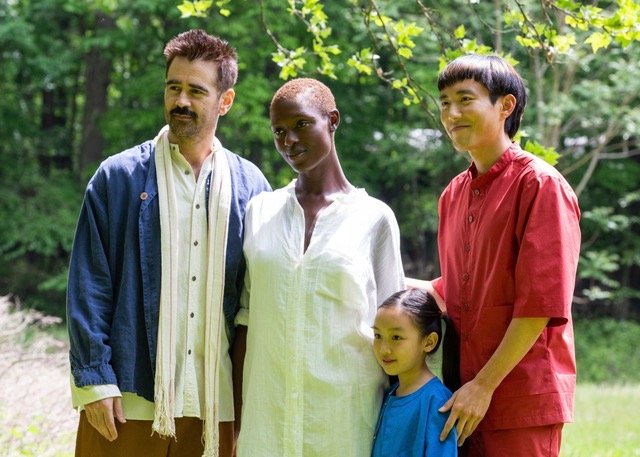After Yang: Colin Farrell Shines in a Quiet Movie About Love, Memory and Self-Discovery
By Karen Gordon
Rating: B
Lifted by a deep and thoughtful performance by Colin Farrell, After Yang is a poetic and subtle meditation about the aftermath of unexpected sadness over the loss of “someone” who is technically not human.
Farrell is Jake, married to Kyra (Jodie Turner-Smith). They are the parents of Mika (Malea Emma Tjandrawidjaja). Mika, who is about nine years old, is adopted and of Chinese ancestry. And then there’s Yang (Justin Min).
Yang, who appears to be in his early 20s, is a brother, a companion, and a tutor for Mika. He’s also an android. Or, in this future world, a “technosapien.” Jake and Kira bought him specifically to give Mika a connection to her Chinese heritage.
The happy family - one of whom is not flesh and blood.
Yang is a gentle presence who focuses on Mika as if she was a treasured little sister. She, in turn, calls him Gege, a Mandarin word for brother. Yang fits easily in the family dynamic, joining them at the table for meals, and participating in family games.
Then one day he malfunctions and simply stops dead. We’re reminded that he’s technology.
Can he be fixed? They try to reassure Mika. But like any tech, there are issues. Jake admits to Kyra that Yang wasn't new, but was reconditioned. And so, it is unknown whether he’s still under warranty or if he’s even repairable.
As Jake searches for someone who can fix Yang, he gets access to the android’s “spyware,” memories or moments that Yang wanted to hold on to. And looking at those has a gently transformative effect on Jake.
This is the second feature film from writer/director Kogonada, (who also edited the film). It’s based on Anthony Weinstein’s short story Saying Goodbye to Yang.
After Yang is science fiction, but Kogonada has deliberately given us a future world that is not dominated by technology. Jake, Kyra and Mika live in a lovely and quiet modern home, with a slightly Asian aesthetic: natural elements of wood, stone and green plants incorporated into a clean design. The tech, if there is any, isn’t evident. We barely see a computer in the film. In the house, the mood is gentle and serene.
Jake seems like a man from another time. He owns a tea shop, where he sells blends he carefully makes himself. We get the sense that this “old fashioned” kind of tea, and the ways of brewing it are not a hit. Kyra’s job is what keeps the family afloat.
There are hints here and there that Jake isn’t completely comfortable with some modern technology. For instance, he has a known prejudice against clones, including a neighbour’s daughter. But he’s not aggressive about it. Kogonada doesn’t make any of the tastes or choices of the characters scream here.
After Yang is really Jake’s story. And Jake, as played by Farrell, is a quiet, watchful man with a slightly melancholy air. He loves his family and is active in their support and care.
Initially, he doesn’t seem like a man carrying a big psychological burden. But as the film goes on, Farrell shows us that, although Jake is present to the people who need him and capable of loving and showing love, internally he feels a little lost. It’s yet another wonderful performance from Farrell, quiet, deep and soulful.
In a film this spare, quiet and minimal, that depth of performance is essential to holding our interest.
It also gives us an interesting perspective on masculinity. Jake's business may not be doing well, and may be the source of some sadness for him. But it doesn’t challenge his masculinity. He holds his ground without being riled, even when he’s challenged, by someone who becomes quite aggressive. Jake’s identity is solid. Whatever internal uncertainties he’s experiencing, from noting the absence of Yang from the family, to reacting to Yang’s memories, Jake holds them inside.
Farrell’s Jake shows us how an ordinary man can allow himself to be transformed without losing his masculine self. This is the antithesis of toxic masculinity.
While Farrell beautifully holds the centre of this quiet and enjoyable small movie, the film’s ambitions sometimes exceed its reach. And yet, this is profound material.
What Kogonada’s After Yang gives us is enough to remind us that, in a world of chaos, the inner life must be considered too. And that’s a beautiful thing.
After Yang. Written and directed by Kogonada. Starring Colin Farrell, Jodie Turner-Smith, Justin Lin, and Malea Emma Tjandrawidjaja. Opens in select theatres March 11.


